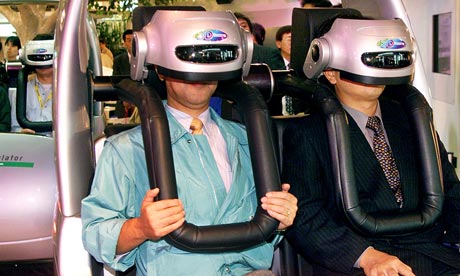Are a new generation of Japanese men really losing interest in sex? And if so, what's behind the malaise?


Japanese men enjoying virtual reality driving. Photograph: Kazuhiro Nogi/EPA
It's not easy being a young man in Japan today. Every few months sees the release of a new set of figures, stats and stories trumpeting the same meme: today's Japanese men are unmanly – and worse, they don't seem bothered by it.
Tagged in the domestic media over the past few years as hikikomori(socially withdrawn boys), soshoku danshi (grass-eating/herbivore men, uninterested in meat, fleshly sex and physical or workplace competition), or just generally feckless, Japan's Y-chromosomed youth today elicit shrugs of "why?", followed by heaving sighs of disappointment from their postwar elders and members of the opposite sex. With the country's economy stagnant at best, its geopolitical foothold rapidly slipping into the crevice between China and the United States, and its northeast coastline still struggling with the aftermath of disaster and an ongoing nuclear crisis, the reaction to a failure of Japan's men to take the reins, even symbolically, has evolved from whispers of curiosity to charges of incompetence.
In the most recent government study, published at the end of last month, the percentage of unmarried men spiked 9.2 points from five years ago. More telling: 61% of those unwed men reported not having a girlfriend, and 45% said they couldn't care less about finding one.
What gives? As anyone who has watched Japanese or Korean pop videos knows, the popular image of men in Asia, seen from a western perspective, is more effeminate than macho, rife with makeup, stylised hairdos and choreographed dance steps. Even so-called punks in Japan lean more to Vivienne Westwood than Malcolm McLaren – more familiar with fashion spreads than the spitting in the street.
And yet Japan was rebuilt from the ashes of the second world war into an economic and technological powerhouse with historically unprecedented speed on the backs of labourers, mainly men, laying the rails of the nation's astonishing bullet train, for example.
Why the generational malaise and indifference to sex? Theories abound. The most provocative to me, a Japanese-American and longtime Tokyo resident, is that Japanese women have become stronger socially and economically at the very same time that Japanese men have become more mole-ish and fully absorbed in virtual worlds, satiated by the very technological wizardry their forebears foisted upon them, and evenpreferring it to reality. "I don't like real women," one bloke superciliously sniffed on Japan's 2channel, the world's largest and most active internet bulletin board site. "They're too picky nowadays. I'd much rather have a virtual girlfriend."
Virtual girlfriends became a sensation last summer, when Japanese game-maker Konami released its second-generation of its popular Love Plus, called, aptly, Love Plus +, for the Nintendo DS gaming system. Konami skillfully arranged for an otherwise deadbeat beach resort town called Atami to host a Love Plus + holiday weekend. Players were invited to tote their virtual girlfriends, via the gaming console, to the actual resort town to cavort for a weekend in romantic bliss. The promotion wasabsurdly successful, with local resort operators reporting that it was their best weekend in decades.
I tried to explain the phenomenon via a TV interview for a US cable station: the men who spent their yen on a weekend of romance with a digital lover were a subset of a subculture many times removed from mainstream Japan. They are known as otaku, or hyper-obsessive and often asocial men who seek solace in imaginary worlds (not unlike many artists and writers, I should add). Nevertheless, these were clearly young Japanese man of a generation that found the imperfect or just unexpected demands of real-world relationships with women less enticing than the lure of the virtual libido. You can't have sex with a digital graphic, but you can get sexually excited, and maybe satisfied, by one.
The phrase "herbivore men" was coined by a female Japanese journalist in 2006. By 2009, the Japanese male's lack of ambition, sexually or otherwise, had become a media meme. With the latest reports in Japan, of men who can't get it up for real women who won't get married or have kids, the mutual gender-chill phenomenon has become mainstream. It may be the future, but is it really Japanese?
"Maybe we're just advanced human beings," says a Japanese friend of mine over dinner this week in Tokyo, who won't let me use her real name. She is an attractive, 40-something editor at one of Japan's premier fashion magazines, and she is still single.

Does this trend indicate, women who are socially and economically more dominant are less attractive and less desired by men?
ReplyDeleteIllnesses of a post-modern society... Not advanced but maldeveloped.
ReplyDeleteSimpler people of simpler times, lives happier, healthier and more fulfilling lives than these modern and post-modern societies..
HOW IS THAT MORE ADVANCED WHAT HAPPENS WHEN YOUR RACE BECOMES PRONE TO EXTINCTION!!!
ReplyDelete